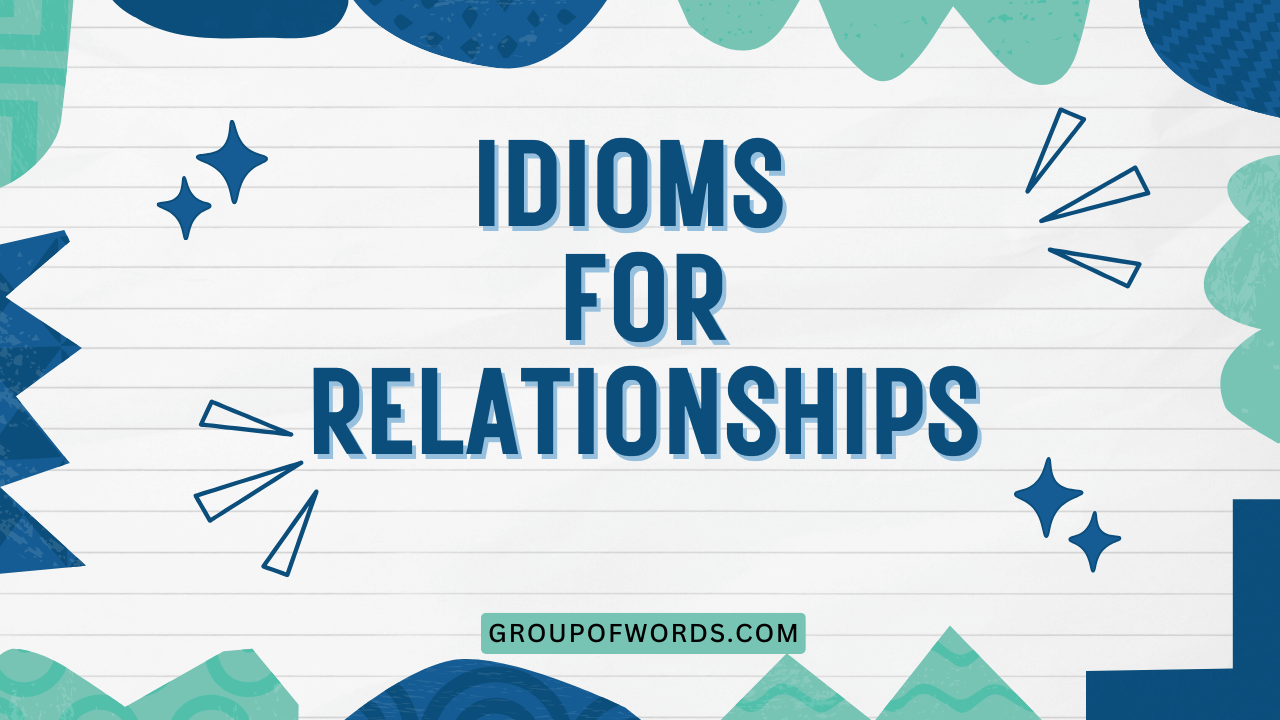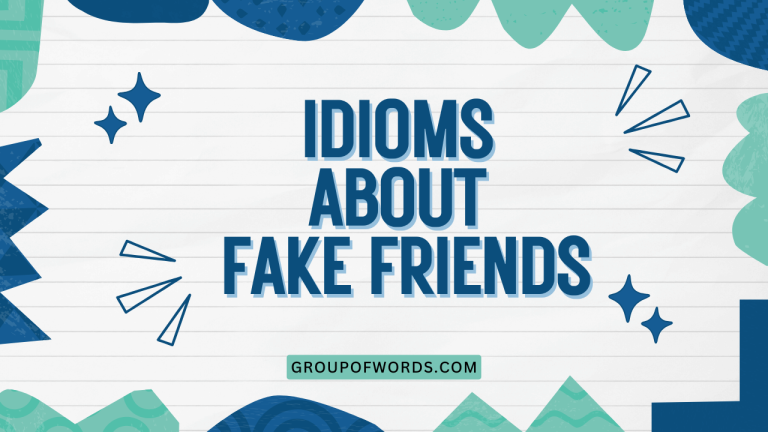Relationship Idioms: Mastering English Expressions of Love & Conflict
Understanding idioms is crucial for mastering English, especially when discussing relationships. Idioms add color and depth to your language, allowing you to express complex emotions and situations succinctly.
This article delves into the world of relationship idioms, providing definitions, examples, and usage rules. Whether you’re an ESL learner or a native speaker, this guide will enhance your understanding and use of English idioms in the context of relationships.
Table of Contents
- Introduction
- Definition of Relationship Idioms
- Structural Breakdown
- Types and Categories of Relationship Idioms
- Examples of Relationship Idioms
- Usage Rules for Relationship Idioms
- Common Mistakes with Relationship Idioms
- Practice Exercises
- Advanced Topics in Relationship Idioms
- FAQ: Frequently Asked Questions
- Conclusion
Definition of Relationship Idioms
Idioms are expressions whose meanings cannot be understood from the literal meanings of the individual words. Instead, they function as a unit with a figurative meaning. Relationship idioms specifically relate to interactions, feelings, and situations between people in romantic, familial, or platonic connections. These idioms often convey emotions or circumstances more vividly than straightforward language.
Understanding relationship idioms is vital for interpreting conversations and literature, as well as for expressing oneself more naturally and expressively. They are a cornerstone of fluent and idiomatic English.
Structural Breakdown
Most idioms follow a set structure, though they are not always grammatically conventional. They can be phrases, clauses, or even sentences.
The key is that their collective meaning is different from the sum of their parts.
For example, in the idiom “to have a crush on someone,” each word has its own meaning, but the entire phrase signifies a feeling of infatuation. Understanding the underlying structure can help in remembering and using these idioms correctly.
Types and Categories of Relationship Idioms
Relationship idioms can be categorized based on the different stages and aspects of relationships. Here are some common categories:
Idioms for Falling in Love
These idioms describe the initial stages of attraction and affection.
Idioms for Being in Love
These idioms represent the state of being in a loving and committed relationship.
Idioms for Relationship Difficulties
These idioms describe problems, conflicts, or challenges in a relationship.
Idioms for Breaking Up
These idioms refer to the end of a relationship.
Idioms for Commitment
These idioms describe long-term commitment and serious relationships.
Examples of Relationship Idioms
This section provides an extensive list of relationship idioms, categorized for clarity and ease of learning. Each table contains examples showcasing the idiom in context.
Table 1: Idioms for Falling in Love
This table presents idioms used to describe the initial stages of falling in love, including feelings of attraction, infatuation, and developing affection.
| Idiom | Meaning | Example Sentence |
|---|---|---|
| To have a crush on someone | To be infatuated with someone | She has a crush on the new guy in her class. |
| To fall head over heels | To fall deeply and madly in love | They fell head over heels for each other during their summer vacation. |
| To be smitten with someone | To be charmed or captivated by someone | He was completely smitten with her from the moment they met. |
| To have eyes only for someone | To be attracted to only one person | Since they started dating, he has eyes only for her. |
| To be swept off one’s feet | To fall in love quickly and intensely | He swept her off her feet with his charm and wit. |
| To carry a torch for someone | To be in love with someone who doesn’t reciprocate | Even after all these years, he still carries a torch for his high school sweetheart. |
| Hit it off | To get along well with someone immediately | We hit it off immediately and talked for hours. |
| Love at first sight | To fall in love immediately upon meeting someone | They say it was love at first sight when they met at the coffee shop. |
| To be infatuated with | To have a short-lived passion or admiration for someone | Teenagers often become infatuated with pop stars. |
| To take a shine to someone | To start liking someone | She took a shine to him as soon as they started working together. |
| Get the hots for someone | To be sexually attracted to someone | He definitely got the hots for her when she walked in the room. |
| Have a thing for someone | To be attracted to someone | I think she has a thing for the new teacher. |
| To be sweet on someone | To be romantically interested in someone | He’s been sweet on her ever since they met. |
| To fall for someone | To begin to love someone | I started to fall for him after our first date. |
| To be head over heels for someone | To be completely in love with someone | She is head over heels for her new boyfriend. |
| To click with someone | To immediately feel a connection with someone | We clicked right away when we met at the party. |
| To be drawn to someone | To be attracted to someone | I was immediately drawn to her intelligence and wit. |
| To feel butterflies in your stomach | To feel nervous and excited when seeing or thinking about someone you like | I always feel butterflies in my stomach whenever I see him. |
| To be smitten as a kitten | To be utterly charmed and captivated by someone | He was smitten as a kitten from the moment he saw her smile. |
| To be love-struck | To be so in love that you seem unable to think of anything else | He was completely love-struck after their first date. |
| To get googly-eyed over someone | To look at someone with obvious infatuation | She gets googly-eyed over him every time he speaks. |
| To feel a spark | To feel a sudden connection or attraction | We felt a spark between us the first time we met. |
| To be captivated by someone | To be completely charmed and fascinated by someone | He was captivated by her intelligence and charm. |
Table 2: Idioms for Being in Love
This table details idioms that describe the state of being in a loving and committed relationship, including phrases about affection, contentment, and partnership.
| Idiom | Meaning | Example Sentence |
|---|---|---|
| Like two peas in a pod | Very similar and always together | They are like two peas in a pod; they do everything together. |
| To be the apple of one’s eye | To be cherished above all others | His granddaughter is the apple of his eye. |
| To be head over heels in love | To be completely and deeply in love | They are head over heels in love after only a few months of dating. |
| To be lovey-dovey | To be excessively affectionate, often in public | They were being so lovey-dovey that it made everyone uncomfortable. |
| To be a match made in heaven | To be perfectly suited for each other | Everyone says they are a match made in heaven. |
| To have a soft spot for someone | To feel affection for someone | He has a soft spot for his younger sister. |
| To be an item | To be in a romantic relationship | They’ve been an item since they met at college. |
| To be joined at the hip | To be inseparable | Those two are joined at the hip; you never see them apart. |
| To wear your heart on your sleeve | To openly show your emotions | She wears her heart on her sleeve, so everyone knows how she feels. |
| To be wrapped around someone’s little finger | To be easily controlled by someone | He is completely wrapped around her little finger. |
| To be crazy about someone | To be very much in love with someone | She is crazy about her new boyfriend. |
| To adore someone | To love and admire someone deeply | He adores his wife and children. |
| To worship the ground someone walks on | To admire and love someone excessively | He worships the ground she walks on. |
| To dote on someone | To show excessive love and attention | She dotes on her grandchildren. |
| To cherish someone | To protect and care for someone lovingly | He cherishes every moment they spend together. |
| To treasure someone | To value and appreciate someone greatly | She treasures their friendship above all else. |
| To be inseparable | To be unable to be separated | They are inseparable since they became friends. |
| To be best buds | To be very close friends | They’ve been best buds since childhood. |
| To be a perfect match | To be ideally suited to each other | They are a perfect match in every way. |
| To be soulmates | To be two people who are perfectly suited to each other | They believe they are soulmates. |
| To be each other’s rock | To be a source of strength and support for each other | They are each other’s rock during difficult times. |
| To be partners in crime | To be close friends who share adventures and mischief | They are partners in crime and always up to something. |
| To be two halves of a whole | To perfectly complement each other | They are two halves of a whole and complete each other. |
| To be on the same wavelength | To understand each other perfectly | They are always on the same wavelength. |
Table 3: Idioms for Relationship Difficulties
This table includes idioms that describe problems, conflicts, or challenges that arise in relationships, encompassing misunderstandings, arguments, and periods of strain.
| Idiom | Meaning | Example Sentence |
|---|---|---|
| To be on the rocks | To be experiencing difficulties | Their marriage is on the rocks after the recent arguments. |
| To go through a rough patch | To experience a difficult period | They are going through a rough patch in their relationship. |
| To argue like cats and dogs | To argue frequently and intensely | They argue like cats and dogs whenever they are together. |
| To have a falling out | To have a serious argument that damages a relationship | They had a falling out over a misunderstanding. |
| To give someone the cold shoulder | To intentionally ignore someone | She gave him the cold shoulder after he forgot her birthday. |
| To be at each other’s throats | To argue or fight fiercely | They are at each other’s throats all the time. |
| To be on bad terms | To have a strained relationship | They are on bad terms since their disagreement. |
| To drive a wedge between | To cause a division or separation | His lies drove a wedge between them. |
| To be a thorn in someone’s side | To be a constant source of annoyance | His constant complaining is a thorn in her side. |
| To rub someone the wrong way | To annoy or irritate someone | His arrogance rubs me the wrong way. |
| To be on thin ice | To be in a precarious situation | He’s on thin ice with his girlfriend after lying to her. |
| To be walking on eggshells | To be very careful not to offend someone | I feel like I’m walking on eggshells around him lately. |
| To have a bone to pick with someone | To have a grievance to discuss with someone | I have a bone to pick with you about what you said yesterday. |
| To hit a nerve | To touch upon a sensitive issue | I think I hit a nerve when I mentioned her ex-boyfriend. |
| To get on someone’s nerves | To irritate or annoy someone | His constant humming gets on my nerves. |
| To be at loggerheads | To be in strong disagreement | They are at loggerheads over the budget. |
| To lock horns | To engage in a conflict or argument | They often lock horns over political issues. |
| To cross swords | To argue or disagree strongly | They crossed swords during the debate. |
| To not see eye to eye | To disagree | They don’t see eye to eye on many issues. |
| To have words | To have an argument | They had words after the party last night. |
| To give someone a piece of your mind | To express your anger or displeasure | I’m going to give him a piece of my mind for what he did. |
| To air dirty laundry | To discuss private or embarrassing matters publicly | They aired their dirty laundry in front of everyone. |
| To sweep something under the rug | To ignore or hide a problem | They tried to sweep the issue under the rug. |
| To pour oil on troubled waters | To try to calm a situation | He tried to pour oil on troubled waters during their argument. |
Table 4: Idioms for Breaking Up
This table presents idioms that describe the end of a relationship, including phrases about separation, disappointment, and moving on.
| Idiom | Meaning | Example Sentence |
|---|---|---|
| To break up | To end a romantic relationship | They decided to break up after five years together. |
| To call it quits | To end a relationship or activity | They called it quits because they were no longer happy. |
| To split up | To end a relationship | They split up after a series of arguments. |
| To go separate ways | To end a relationship and live different lives | They decided to go their separate ways. |
| To be history | To be over or finished | Their relationship is history after that fight. |
| To dump someone | To end a relationship with someone | She dumped him because he was unreliable. |
| To get dumped | To be the person who is left in a relationship | He got dumped last week. |
| To kick someone to the curb | To end a relationship abruptly | She kicked him to the curb after finding out about his lies. |
| To leave someone in the lurch | To abandon someone in a difficult situation | He left her in the lurch when she needed him most. |
| To be on the outs with someone | To be temporarily not on good terms | They are on the outs with each other right now. |
| To be over someone | To have recovered from a broken heart | She is finally over her ex-boyfriend. |
| To move on | To start a new phase in life after a relationship ends | It’s time for him to move on and find someone new. |
| To patch things up | To resolve a disagreement and restore a relationship | They tried to patch things up, but it didn’t work. |
| To kiss and make up | To resolve a disagreement with affection | They kissed and made up after their argument. |
| To bury the hatchet | To make peace after a conflict | They decided to bury the hatchet and be friends again. |
| To clear the air | To resolve misunderstandings | They needed to clear the air after the argument. |
| To part ways | To end a relationship | They decided to part ways amicably. |
| To sever ties | To end a relationship completely | They severed ties after the divorce. |
| To throw in the towel | To give up on a relationship | He threw in the towel because he couldn’t handle the stress. |
| To go kaput | To come to an end | Their relationship went kaput after the infidelity. |
| To come to an end | To finish or conclude | All good things must come to an end. |
| To reach a breaking point | To reach a point where a relationship can no longer continue | They reached a breaking point and decided to separate. |
| To come undone | To fall apart or fail | Their relationship came undone due to constant stress. |
| To turn sour | To become unpleasant or negative | The relationship turned sour after the argument. |
Table 5: Idioms for Commitment
This table showcases idioms related to long-term commitment and serious relationships, including phrases about marriage, promises, and enduring love.
| Idiom | Meaning | Example Sentence |
|---|---|---|
| To tie the knot | To get married | They are planning to tie the knot next summer. |
| To walk down the aisle | To get married | She is excited to walk down the aisle. |
| To pop the question | To propose marriage | He is going to pop the question on their anniversary. |
| To take the plunge | To make a major decision, like getting married | They decided to take the plunge and get married. |
| To settle down | To start living a stable life, often with marriage | They are ready to settle down and start a family. |
| To be husband and wife | To be married | They are finally husband and wife. |
| To be an old married couple | To behave like a long-married couple, even if not married | They bicker like an old married couple. |
| To be joined at the hip | To be inseparable, often used for married couples | They are joined at the hip after 50 years of marriage. |
| To be a lifelong commitment | To be a commitment that lasts for the duration of one’s life | Marriage is a lifelong commitment. |
| To be together through thick and thin | To be together during good times and bad times | They promised to be together through thick and thin. |
| To weather the storm | To survive a difficult situation together | They weathered the storm of financial difficulties together. |
| To build a life together | To create a shared life and future | They are excited to build a life together. |
| To grow old together | To spend the rest of one’s life with someone | They hope to grow old together. |
| To be each other’s better half | To be the person who completes or improves the other | She is definitely his better half. |
| To stand the test of time | To remain strong and lasting over a long period | Their love stood the test of time. |
| To have and to hold | To commit to cherish and care for someone forever | They vowed to have and to hold each other. |
| To be devoted to someone | To be completely dedicated to someone | He is completely devoted to his wife. |
| To be faithful to someone | To be loyal and committed to someone | She has always been faithful to her husband. |
| To keep the home fires burning | To maintain a warm and welcoming home | She always keeps the home fires burning for her family. |
| To put down roots | To settle in a place and make it your home | They decided to put down roots in the countryside. |
| To start a family | To begin having children | They are planning to start a family soon. |
| To have a bun in the oven | To be pregnant | She has a bun in the oven. |
| To be a family man/woman | To prioritize family life | He is a true family man. |
| To lay down roots | To establish a permanent home and life | They decided to lay down roots in the small town. |
Usage Rules for Relationship Idioms
Using idioms correctly requires understanding their specific context and nuances. Here are some general guidelines:
- Context is key: Idioms can change meaning slightly based on the context of the conversation.
- Know your audience: Some idioms are more formal than others. Choose idioms appropriate for your audience.
- Don’t mix idioms: Avoid combining parts of different idioms; this can lead to confusion and sound unnatural.
- Pay attention to prepositions: Many idioms rely on specific prepositions. Using the wrong one can alter the meaning or make the idiom incorrect. For example, it’s “fall for someone,” not “fall to someone.”
- Practice: The best way to master idioms is to use them in conversation and writing.
Common Mistakes with Relationship Idioms
Learners often make mistakes when using idioms due to their figurative nature. Here are some common errors and how to avoid them:
- Literal interpretation: Interpreting idioms literally instead of understanding their figurative meaning.
- Incorrect word choice: Substituting words within an idiom changes its meaning or renders it nonsensical.
- Misunderstanding the context: Using an idiom in an inappropriate situation.
Table 6: Correct vs. Incorrect Usage
This table illustrates common mistakes made when using relationship idioms, providing both the incorrect and correct examples for clarity.
| Incorrect | Correct | Explanation |
|---|---|---|
| She fell head over shoes for him. | She fell head over heels for him. | The correct idiom is “head over heels,” not “head over shoes.” |
| They are like two apples in a pod. | They are like two peas in a pod. | The correct idiom is “two peas in a pod,” meaning very similar. |
| Their marriage is on the rocks stone. | Their marriage is on the rocks. | The correct idiom is “on the rocks,” meaning experiencing difficulties. |
| He gave her a cold arm. | He gave her the cold shoulder. | The correct idiom is “give someone the cold shoulder,” meaning to ignore someone. |
| They called the quits on it. | They called it quits. | The correct idiom is “call it quits,” meaning to end something. |
| She dumped him to the curb. | She kicked him to the curb. | The correct idiom is “kick someone to the curb,” meaning to end a relationship abruptly. |
| Let’s bury the axe. | Let’s bury the hatchet. | The correct idiom is “bury the hatchet,” meaning to make peace. |
| He popped a question. | He popped the question. | The correct idiom is “pop the question,” meaning to propose marriage. |
| They are settling down the roots. | They are putting down roots. | The correct idiom is “put down roots,” meaning to settle in a place. |
| They are together through fat and skinny. | They are together through thick and thin. | The correct idiom is “through thick and thin,” meaning through good times and bad. |
Practice Exercises
Test your understanding of relationship idioms with these exercises. Fill in the blanks with the appropriate idiom from the list provided.
Table 7: Practice Exercise 1
This table contains sentences with blanks where you should insert the correct idiom from the provided list to complete the sentence appropriately.
| Question | Answer |
|---|---|
| 1. After their big fight, they decided to _______ and try to fix their relationship. (patch things up, call it quits, hit it off) | patch things up |
| 2. She completely _______ for him after their first date; she couldn’t stop thinking about him. (fell head over heels, gave him the cold shoulder, had a falling out) | fell head over heels |
| 3. They _______ immediately when they met at the party and talked for hours. (hit it off, are on the rocks, went their separate ways) | hit it off |
| 4. Their marriage _______ after years of constant arguments and disagreements. (is on the rocks, tied the knot, went kaput) | went kaput |
| 5. After dating for five years, he finally decided to _______ and asked her to marry him. (pop the question, give her the cold shoulder, sweep her off her feet) | pop the question |
| 6. They _______ after the argument and haven’t spoken since. (had a falling out, are joined at the hip, are like two peas in a pod) | had a falling out |
| 7. He’s been _______ since she left him; he can’t seem to move on. (carrying a torch for her, worshiping the ground she walks on, building a life together) | carrying a torch for her |
| 8. Even though they argue sometimes, they always _______ and resolve their issues. (kiss and make up, drive a wedge between, get on each other’s nerves) | kiss and make up |
| 9. They are _______; they are always together and do everything as a team. (joined at the hip, on thin ice, on bad terms) | joined at the hip |
| 10. She decided to _______ after finding out about his lies and betrayal. (kick him to the curb, be head over heels in love, weather the storm) | kick him to the curb |
Table 8: Practice Exercise 2
This table presents sentences where you must choose the correct idiom from the multiple-choice options to complete the sentence accurately.
| Question | Answer |
|---|---|
| 1. They are always arguing; they _______. (a) argue like cats and dogs (b) argue like birds and fish (c) argue like horses and cows) | (a) argue like cats and dogs |
| 2. She is always so supportive; she is _______. (a) his better half (b) his good side (c) his best part) | (a) his better half |
| 3. They decided to _______ and start a family. (a) settle down (b) settle up
(c) settle out) |
(a) settle down |
| 4. After many years, their love _______. (a) stood the test of time (b) sat the test of time (c) ran the test of time) | (a) stood the test of time |
| 5. They had a disagreement and now they _______. (a) are on good terms (b) are on bad terms (c) are on fair terms) | (b) are on bad terms |
| 6. He is completely _______ with her. (a) love-struck (b) love-stricken (c) love-stuck) | (a) love-struck |
| 7. They want to _______ next year. (a) tie a knot (b) tie the knot (c) tie knots) | (b) tie the knot |
| 8. She _______ when she met him. (a) felt sparks (b) felt a spark (c) felt the spark) | (b) felt a spark |
| 9. They decided to _______ and end the relationship. (a) part ways (b) part the ways (c) part their ways) | (a) part ways |
| 10. He is always _______ her. (a) doting on (b) doting at (c) doting in) | (a) doting on |
Advanced Topics in Relationship Idioms
For advanced learners, exploring the origin and evolution of relationship idioms can provide a deeper understanding. Many idioms have historical or cultural roots that add layers of meaning.
Additionally, analyzing how idioms are used in literature and media can enhance comprehension and appreciation of their impact.
FAQ: Frequently Asked Questions
Why is it important to learn relationship idioms?
Learning relationship idioms enhances your understanding of colloquial English, making conversations and media more accessible. It also allows you to express nuanced emotions and situations more effectively.
How can I remember relationship idioms more easily?
Associate each idiom with a vivid image or a personal experience. Use the idioms in your own sentences and conversations to reinforce your memory.
Are relationship idioms universal across different English-speaking countries?
While many relationship idioms are widely used, some may be more common in certain regions or countries. Pay attention to the context and audience when using idioms.
Can I create my own relationship idioms?
While it’s generally best to use established idioms, creative language use is always encouraged. However, ensure that your invented idioms are easily understandable and contextually appropriate.
Where can I find more examples of relationship idioms in use?
Read English literature, watch English-language movies and TV shows, and listen to podcasts or conversations. Pay attention to how native speakers use idioms in different contexts.
Conclusion
Relationship idioms are a vibrant and essential part of the English language. By understanding their meanings, usage rules, and common pitfalls, you can significantly enhance your communication skills and cultural literacy.
Keep practicing and exploring new idioms to enrich your vocabulary and express yourself more fluently. Embrace the colorful world of idioms and watch your English language skills flourish.






